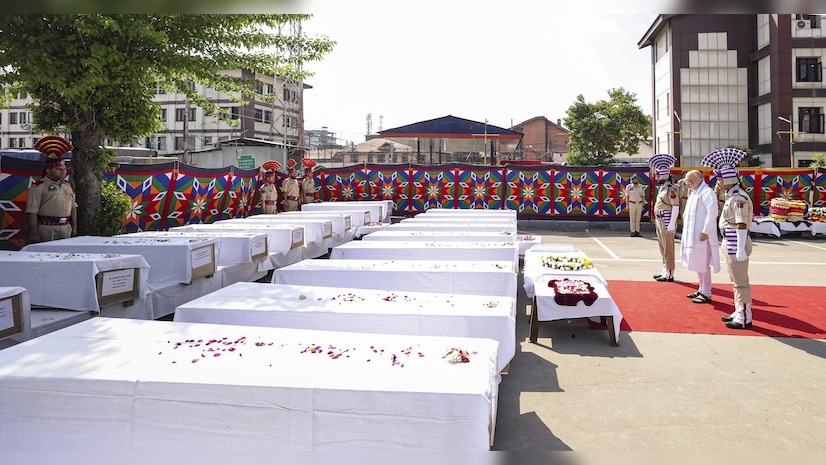 English
English

Security forces intensify operations against 14 active terrorists in J&K, suspecting Lashkar’s role in Pahalgam attack. Read more on Dynamite News

Intelligence Sources Reveals List Of 14 Terrorists
New Delhi: In a significant development amid rising security concerns following the recent terror attack in Pahalgam, Jammu, and Kashmir, intelligence agencies have compiled a list of 14 local terrorists who are actively operating in the Union Territory.
Security forces have intensified operations against terrorists involved in the Pahalgam tourist massacre, demolishing seven houses of identified Kashmiri militants. Two local helpers were arrested with weapons.
A list of 14 terrorists has been prepared by intelligence sources. According to Dynamite News correspondent, these 14 individuals worked as helpers for Pakistani terrorists.
Parallel operations target Pakistani/Bangladeshi nationals in Gujarat, with Ahmedabad police detaining over 1,000 for deportation.
The list of 14 includes those terrorists who have been involved and active since April this year. That search operation has been intensified. It has been going on over the last couple of days where the houses of many Lashkar operatives, for example, have also been demolished.
Agencies suspect that the recent Pahalgam attack was carried out by Lashkar.
These terrorists are linked to Lashkar-e-Taiba, Hizbul Mujahideen, and Jaish-e-Mohammed. This list includes terrorists who have been continuously assisting Pakistani infiltrators in these areas, functioning as helpers and sleeper cells.
On the first day itself, The Resistance Front came up with a social media claim saying they were the ones who carried this out. Of course, now they have issued a denial, saying their social media handle was hacked and they are not behind it.
Intel agencies named 14 terrorists - 8 from Lashkar, 3 each from Hizbul & Jaish - including district commanders Adil Rehman (LeT) and Asif Ahmed Sheikh (JeM).
But this matches completely with 8 Lashkar cadres—most active till April—and the suspicion that it is Lashkar-backed TRF, which is responsible for Pahalgam. Three others—each from Jaish-e-Mohammed and Hizbul—have also been active in this area.
Action has already been taken against five of these most-wanted, whose names are on this list. Action has been taken in Bijbehara, Tral, Shopian, Kulgam, and Pulwama. These five names also feature in the list of 14.
These are believed to be terrorists who are actively helping and aiding Pakistani terrorists. Some have even gone over to Lashkar’s Taiba camps in Pakistan and undergone training.
Some of them have returned and are carrying out recce of areas like what we saw in Pahalgam, helping Pakistan carry out its terror.
The terrorists have been identified, and rewards have been announced on them. And the sentiment in Kashmir, in general, is not in favor of these local terrorists at all.
So, the agencies are quite hopeful that sooner or later, as soon as these terrorists attempt to come down from the altitudes and establish any kind of contact with the local population, they will be exposed.
And eventually, they will need food—their food supply will run out. And the weather has also suddenly dipped, Pallavi.
It was warm the last two days, but it has suddenly dipped and become quite cold. So, if this kind of weather continues, it might be difficult for them to sustain in the higher altitudes for too long.
We have seen that in many areas—whether Pulwama, Tral, or Shopian—security forces are taking large-scale action. The homes of these terrorists are being completely razed to the ground. The objective is to cut off their funding, local support, and any assistance from their families.
The agencies have expanded across Pahalgam and on the other side of Pir Panjal—also in Udhampur, Doda, Kishtwar, Rajouri, and Poonch. All these areas are being looked out as there are natural caves Pakistani terrorists have exploited in the past in the Rajouri-Poonch sector.
But this time, the forces are not wanting to give them any chance. All the high-altitude areas are currently seeing a CASO (Cordon and Search Operation), which is a coordinated search operation.